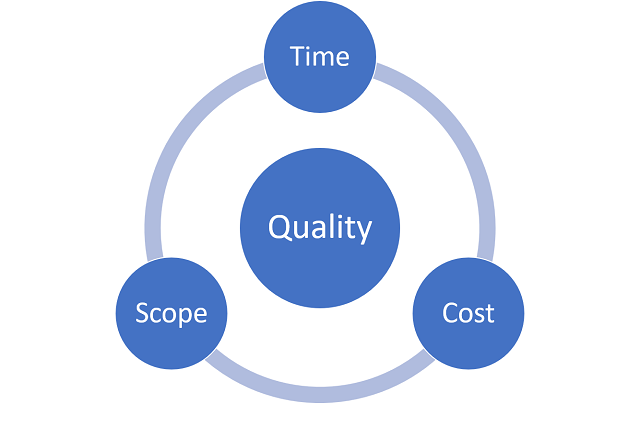This article is available in video mode on our YouTube channel.
1. Introduction
In this article, we will explain the difference between PMP, PgMP, and PfMP.
If you still don’t know the difference between a Portfolio, a Program, and a Project, we advise you to check our previous article.
2. PMP
PMP has turned into a career-mark, an almost must-have for professionals across all industries. With numbers soaring in millions, the credential is the reigning champion amongst all credentials.
PMP stands for Project Management Professional. It covers the management of projects within the constraints of time, cost, and scope, in addition to quality. Project management balances those constraints e.g., if the management wants to decrease the project duration, the project manager will have to add more resources, hence, increase cost; or remove some features, hence shrinking the scope; or lowering the quality of the delivered product.
The PMP exam does not only require experience managing projects but a thorough theoretical study of multiple references of which the PMBOK is the most important one. PMI gives importance to the PMBOK as a golden standard for project management and for the PMP exam. The material is ginormous, with a multitude of concepts, terminologies, and formulas. However, because of its wide exposure, you can find a lot of study material for the PMP certification online but pay attention in choosing a course provider and in choosing the proper help for your application preparation and the proper QB.
The exam consists of 180 questions to be answered in 230 minutes. It can be taken online or in-person. Noting that for scheduling the exam, you need to fulfill the prerequisites for PMP and pass the application process.
3. PgMP
Moving forward, PgMP, is not, as a lot of people think, managing a bigger project.
PgMP stands for Program Management Professional. It revolves around managing multiple endeavors that are interdependent in nature and that provide greater benefit(s) to the organization if managed together rather than separately. An endeavor can be a project, program (referred to as sub-program in this case), and any activity pertaining to the proper program management i.e., communication, risk, stakeholder, and resource management.
By now, you’d figure it out. Programs have usually longer timespans than projects and usually combine the interdependent roadmaps of the endeavors that they include.
Although the number of PgMP holders is still in the early thousands, the certification has taken the throne as the hardest of them all. It surpasses the hardship of PMP, PfMP, or any other certification because of the delicate concepts and the ease in confusion between them. Programs are ambiguous in nature and the interdependency adds a higher complexity to that. PgMP exam includes 170 questions to be answered in 4 hours, which, by itself, is a hectic endeavor. It does not only require experience in program management but a thorough theoretical study of multiple references of which the Standard for Program Management is the most important. Noting that for scheduling the exam, you need to fulfill the prerequisites and pass the application process, which is the most important milestone for the certification. The application process is a rigorous, overwhelming, daunting, and demanding process during which you need to demonstrate to panel reviewers your understanding of the program management concepts through translating your experience to a set of summaries called “Experience Summaries”. The panel review is barbaric. We advise not going to ready-made applications or reformulating a colleague’s application, because your submission will be rejected, and you will be barred from making another submission. If needed, focus on finding the right instructor that will assist you in writing your unique experience in your unique words.
Moreover, for PgMP, the Examination Content Outline (ECO) is very important. It is the framework for all exam questions. It is as well the hardest reference to study because concepts in it are scattered, non-sequenced, ambiguous, generic, and seem contradicting with the Standard for Program Management. A lot of candidates try to memorize the ECO, but they end up failing hard because PgMP is not about memorization; it’s about the semantics.
4. PfMP
PfMP stands for Portfolio Management Professional. Its number of holders is roaming in the early thousands worldwide.
Unlike PgMP, ECO does not have an impact on your studies. The Standard for Portfolio Management remains the first and most important reference for the exam. Due to the hardship of understanding portfolio and portfolio management, and due to the fact that rare are project portfolio managers, most candidates need assistance before proceeding to the exam.
The PfMP exam includes 170 questions to be answered in 4 hours. The application process is notorious, standing tall as the hardest between the subject certifications. In contrast to PgMP, PfMP panel review expects candidates to pour their portfolio management experience onto the application in not only a structured manner but within specific portfolio boundaries as well. We advise not going to ready-made applications or reformulating a colleague’s application, because your submission will be rejected, and you will be barred from making another submission. If needed, focus on finding the right instructor that will assist you in writing your unique experience in your unique words.
5. Conclusion
Finally, the subject credentials are individual certifications. So, they are not prerequisites to each other. Whichever fits your experience is the one you should go for.
In this article, we explained the difference between PMP, PgMP, and PfMP.
If you wish to know more about us and the packages we offer, please visit our website or contact us.

